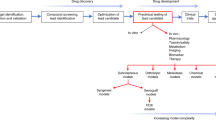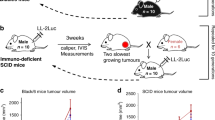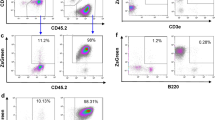Abstract
Transplantation of a Moloney sarcoma-virus (MSV-M)-transformed producer cell line (Sac(+)) induced progressively or regressively growing tumours in mice. Progressive growth always occurred after transplantation of an MSV-M non-producer transformant (Sac(-)), whereas the MSV-M released from the producer cells (Sac virus) always induced tumours which regressed. In contrast to the non-producer, the producer transformant Sac(+) as well as Sac virus induced a strong immune response, detected in vitro by cell- and antibody-mediated cytotoxicity assays, and in vivo by transplantation immunity. Implantation of Sac(-) cells led to solid, under-vascularized tumours, consisting histologically of uniform densely packed tumour cells. Sac-virus-induced tumours, however, were very well vascularized and arose by proliferation of different connective-tissue cells. After transplantation of Sac(+) cells, tumours were found to consist of typical tumour cells morphologically similar to Sac(-) cells intermingled with proliferated connective-tissue cells. Cultivation of tumour fragments from Sac(+) and Sac(-) tumours was followed by outgrowth of transformed tumour cells with the properties of the originally implanted cells. Tumour explant cultures from Sac-virus-induced tumours did not lead to growth of stably transformed cells. Co-culture of mouse embryo fibroblasts (MEF) with Sac(+) cells resulted in overgrowth of the transformed cells. Infection of MEF with Sac virus led to transiently transformed cells. It is concluded that Sac(+) cell tumours will resist the strong immune defence mechanisms they induce and grow progressively, if the inoculated cells are able to build up a solid, poorly vascularized nodule in the tissue. This always happens after implantation of 10(6) cells, but only occasionally when fewer cells are inoculated. Sac-virus-induced tumours will always regress owing to the strong immune response. The regression is furthered by the fact that MSV-M infection rarely if ever leads to a stable transformation.
This is a preview of subscription content, access via your institution
Access options
Subscribe to this journal
Receive 24 print issues and online access
$259.00 per year
only $10.79 per issue
Buy this article
- Purchase on Springer Link
- Instant access to full article PDF
Prices may be subject to local taxes which are calculated during checkout
Similar content being viewed by others
Rights and permissions
About this article
Cite this article
Weiland, F., Weiland, E. & Mussgay, M. Growth pattern of tumours in mice induced by murine Moloney sarcoma-virus and sarcoma-virus-transformed cells. Br J Cancer 40, 932–942 (1979). https://doi.org/10.1038/bjc.1979.288
Issue Date:
DOI: https://doi.org/10.1038/bjc.1979.288



